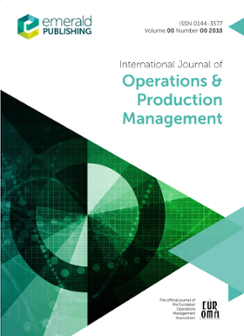The impact of abandoning social responsibility certifications: evidence from the decertification of SA8000 standard
IF 7.4
2区 管理学
Q1 MANAGEMENT
International Journal of Operations & Production Management
Pub Date : 2021-09-07
DOI:10.1108/ijopm-10-2020-0698
引用次数: 5
Abstract
PurposeIn recent years, many companies have decided to decertify from their previously adopted corporate social responsibility (CSR) standards. The aim of this paper is to explore the phenomenon by focusing on the most important auditable CSR standard: Social Accountability 8000 (SA8000).Design/methodology/approachFirst, an event study is performed on a dataset composed of 136 SA8000 decertified public listed companies to analyse the possible relationship between certification, decertification and firms’ operating performance. Second, the authors shed light on the differences between 94 SA8000 (still) certified and the abovementioned 136 decertified firms. Finally, 10 interviews are conducted with decertified firms in the dataset to deepen the outcomes of the previous analyses.FindingsThe results show that, despite an initial positive effect in terms of sales and profitability, decertified companies experienced a reduction in productivity and profitability in the years following the certification, while positive outcomes emerged after the decertification. The study also highlights that certified and decertified firms differ in terms of home country, industry and labour intensity.Originality/valueThe paper contributes to the literature by opening the debate on an important but unexplored research area: the decertification from the most popular CSR standard, i.e. SA8000, and its relationship with firms' performance. In doing this, it also highlights the main differences between decertified and certified companies.放弃社会责任认证的影响:来自SA8000标准取消认证的证据
近年来,许多公司决定取消他们以前采用的企业社会责任(CSR)标准的认证。本文的目的是通过关注最重要的可审计企业社会责任标准:社会责任8000 (SA8000)来探讨这一现象。设计/方法/方法首先,对由136家SA8000被撤销认证的上市公司组成的数据集进行了事件研究,以分析认证、撤销认证与公司经营绩效之间可能存在的关系。其次,作者阐明了94家(仍然)获得SA8000认证的公司与上述136家未获得认证的公司之间的差异。最后,对数据集中未认证的公司进行了10次访谈,以深化之前分析的结果。结果表明,尽管在销售和盈利能力方面产生了最初的积极影响,但在认证后的几年中,被取消认证的公司的生产力和盈利能力有所下降,而积极的结果在取消认证后出现。该研究还强调,认证和非认证公司在母国、行业和劳动强度方面存在差异。原创性/价值本文通过开启一个重要但尚未开发的研究领域的辩论来贡献文献:最流行的企业社会责任标准(即SA8000)的取消认证及其与公司绩效的关系。在这样做的过程中,它也突出了未认证公司和认证公司之间的主要区别。
本文章由计算机程序翻译,如有差异,请以英文原文为准。
求助全文
约1分钟内获得全文
求助全文
来源期刊
CiteScore
13.30
自引率
17.20%
发文量
96
期刊介绍:
The mission of the International Journal of Operations & Production Management (IJOPM) is to publish cutting-edge, innovative research with the potential to significantly advance the field of Operations and Supply Chain Management, both in theory and practice. Drawing on experiences from manufacturing and service sectors, in both private and public contexts, the journal has earned widespread respect in this complex and increasingly vital area of business management.
Methodologically, IJOPM encompasses a broad spectrum of empirically-based inquiry using suitable research frameworks, as long as they offer generic insights of substantial value to operations and supply chain management. While the journal does not categorically exclude specific empirical methodologies, it does not accept purely mathematical modeling pieces. Regardless of the chosen mode of inquiry or methods employed, the key criteria are appropriateness of methodology, clarity in the study's execution, and rigor in the application of methods. It's important to note that any contribution should explicitly contribute to theory. The journal actively encourages the use of mixed methods where appropriate and valuable for generating research insights.

 求助内容:
求助内容: 应助结果提醒方式:
应助结果提醒方式:


